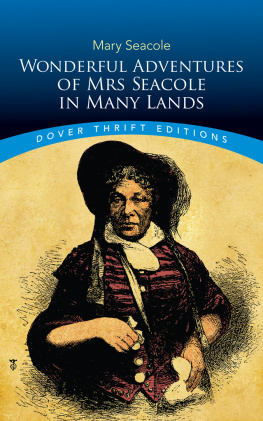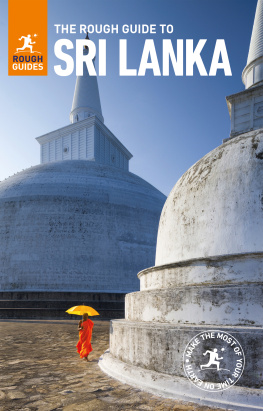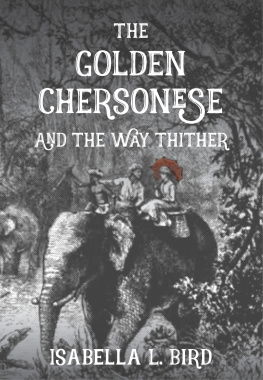WONDERFUL ADVENTURES OF MRS SEACOLE IN MANY LANDS

DOVER THRIFT EDITIONS
GENERAL EDITOR: SUSAN L. RATTINER
EDITOR OF THIS VOLUME: TERRI ANN GEUS
Bibliographical Note
This Dover edition, first published in 2019, is a republication of the edition published by James Blackwood, Paternoster Row, London, in 1857. This book is being reprinted exactly as it was published in an effort to preserve the consistency of the original edition and its historical context, which may include archaic terminology, punctuation, and spelling.
Library of Congress Cataloging-in-Publication Data
Names: Seacole, Mary, 18051881, author.
Title: Wonderful adventures of Mrs Seacole in many lands / Mary Seacole.
Description: Dover thrift editions. | Mineola, New York : Dover Publications, Inc., 2019.
Identifiers: LCCN 2018048295| ISBN 9780486831725 | ISBN 0486831728
Subjects: LCSH: Crimean War, 18531856Personal narratives, Jamaican. | Seacole, Mary, 18051881Travel. | Women, BlackJamaicaBiography.
Classification: LCC DK215 .S43 2019 | DDC 947/.0738092 [B]dc23
LC record available at https://lccn.loc.gov/2018048295
Manufactured in the United States by LSC Communications
83172801 2019
www.doverpublications.com
DEDICATED, BY PERMISSION, TO MAJOR-GENERAL LORD ROKEBY, K.C.B., BY HIS LORDSHIPS HUMBLE AND MOST GRATEFUL SERVANT,
MARY SEACOLE
TO THE READER
I should have thought that no preface would have been required to introduce Mrs Seacole to the British public, or to recommend a book which must, from the circumstances in which the subject of it was placed, be unique in literature.
If singleness of heart, true charity, and Christian works; if trials and sufferings, dangers and perils, encountered boldly by a helpless woman on her errand of mercy in the camp and in the battle-field, can excite sympathy or move curiosity, Mary Seacole will have many friends and many readers.
She is no Anna Comnena, who presents us with a verbose history, but a plain truth-speaking woman, who has lived an adventurous life amid scenes which have never yet found a historian among the actors on the stage where they passed.
I have witnessed her devotion and her courage; I have already borne testimony to her services to all who needed them. She is the first who has redeemed the name of sutler from the suspicion of worthlesseness, mercenary baseness, and plunder; and I trust that England will not forget one who nursed her sick, who sought out her wounded to aid and succour them, and who performed the last offices for some of her illustrious dead.
W. H. RUSSELL
Contents
CHAPTER I
My Birth and Parentage Early Tastes and Travels Marriage, and Widowhood
I WAS BORN in the town of Kingston, in the island of Jamaica, some time in the present century. As a female, and a widow, I may be well excused giving the precise date of this important event. But I do not mind confessing that the century and myself were both young together, and that we have grown side by side into age and consequence. I am a Creole, and have good Scotch blood coursing in my veins. My father was a soldier, of an old Scotch family; and to him I often trace my affection for a camp-life, and my sympathy with what I have heard my friends call the pomp, pride, and circumstance of glorious war. Many people have also traced to my Scotch blood that energy and activity which are not always found in the Creole race, and which have carried me to so many varied scenes: and perhaps they are right. I have often heard the term lazy Creole applied to my country people; but I am sure I do not know what it is to be indolent. All my life long I have followed the impulse which led me to be up and doing; and so far from resting idle anywhere, I have never wanted inclination to rove, nor will powerful enough to find a way to carry out my wishes. That these qualities have led me into many countries, and brought me into some strange and amusing adventures, the reader, if he or she has the patience to get through this book, will see. Some people, indeed, have called me quite a female Ulysses. I believe that they intended it as a compliment; but from my experience of the Greeks, I do not consider it a very flattering one.
It is not my intention to dwell at any length upon the recollections of my childhood. My mother kept a boarding-house in Kingston, and was, like very many of the Creole women, an admirable doctress, in high repute with the officers of both services, and their wives, who were from time to time stationed at Kingston. It was very natural that I should inherit her tastes; and so I had from early youth a yearning for medical knowledge and practice which has never deserted me. When I was a very young child I was taken by an old lady, who brought me up in her household among her own grandchildren, and who could scarcely have shown me more kindness had I been one of them; indeed, I was so spoiled by my kind patroness that, but for being frequently with my mother, I might very likely have grown up idle and useless. But I saw so much of her, and of her patients, that the ambition to become a doctress early took firm root in my mind; and I was very young when I began to make use of the little knowledge I had acquired from watching my mother, upon a great sufferermy doll. I have noticed always what actors children are. If you leave one alone in a room, how soon it clears a little stage; and, making an audience out of a few chairs and stools, proceeds to act its childish griefs and blandishments upon its doll. So I also made good use of my dumb companion and confidante; and whatever disease was most prevalent in Kingston, be sure my poor doll soon contracted it. I have had many medical triumphs in later days, and saved some valuable lives; but I really think that few have given me more real gratification than the rewarding glow of health which my fancy used to picture stealing over my patients waxen face after long and precarious illness.
Before long it was very natural that I should seek to extend my practice; and so I found other patients in the dogs and cats around me. Many luckless brutes were made to simulate diseases which were raging among their owners, and had forced down their reluctant throats the remedies which I deemed most likely to suit their supposed complaints. And after a time I rose still higher in my ambition; and despairing of finding another human patient, I proceeded to try my simples and essences uponmyself.
When I was about twelve years old I was more frequently at my mothers house, and used to assist her in her duties; very often sharing with her the task of attending upon invalid officers or their wives, who came to her house from the adjacent camp at Up-Park, or the military station at Newcastle.
As I grew into womanhood, I began to indulge that longing to travel which will never leave me while I have health and vigour. I was never weary of tracing upon an old map the route to England; and never followed with my gaze the stately ships homeward bound without longing to be in them, and see the blue hills of Jamaica fade into the distance. At that time it seemed most improbable that these girlish wishes should be gratified; but circumstances, which I need not explain, enabled me to accompany some relatives to England while I was yet a very young woman.
I shall never forget my first impressions of London. Of course, I am not going to bore the reader with them; but they are as vivid now as though the year 18 (I had very nearly let my age slip then) had not been long ago numbered with the past. Strangely enough, some of the most vivid of my recollections are the efforts of the London street-boys to poke fun at my and my companions complexion. I am only a little browna few shades duskier than the brunettes whom you all admire so much; but my companion was very dark, and a fair (if I can apply the term to her) subject for their rude wit. She was hot-tempered, poor thing! and as there were no policemen to awe the boys and turn our servants heads in those days, our progress through the London streets was sometimes a rather chequered one.
Next page





